Did you know what you eat can fight heart disease? Your diet is key to managing cholesterol and keeping your heart healthy.
Cholesterol lowering foods are real and backed by science. They help protect your heart. Heart disease is a big concern in the US, so knowing how to manage cholesterol is vital.
Good news: a heart healthy diet doesn’t need big changes. Small food choices can make a big difference. Adding certain nutrients and whole foods can lower bad cholesterol and strengthen your heart.
Researchers at Mass General Brigham have looked into how to manage cholesterol through food. They found effective ways to improve your health.
This guide will show you the best foods to lower cholesterol. They can help you improve your heart health, one bite at a time.
Understanding Cholesterol and Its Impact on Heart Health
Cholesterol is key to your body’s health, but not all types are good. Knowing the difference between good and bad cholesterol helps you choose better foods. This protects your heart and blood vessels.
The Difference Between Good and Bad Cholesterol
Your body has two main types of cholesterol that affect heart health:
- LDL (Low-Density Lipoprotein): Known as “bad” cholesterol, this type can build up in your arteries, increasing heart disease risk
- HDL (High-Density Lipoprotein): Called “good” cholesterol, this helps remove harmful cholesterol from your bloodstream
Why Managing Cholesterol Matters
High cholesterol can cause serious health problems. If not controlled, it raises your risk of:
- Heart attacks
- Stroke
- Peripheral artery disease
The Role of Diet in Cholesterol Management
Your diet is key in managing cholesterol. Eating foods that lower cholesterol helps keep your levels healthy. By choosing the right foods, you can boost your heart health and lower risks.
“Food is the most powerful medicine when it comes to heart health” – Cardiovascular Nutrition Experts
Oatmeal and Whole Grains: Your Heart’s Best Friends
Protecting your heart starts with smart food choices. Oatmeal is a powerful ally in managing cholesterol levels. It’s packed with soluble fiber that helps lower LDL (bad) cholesterol and supports heart health.
Oatmeal’s secret is its unique soluble fiber. This fiber acts like a sponge in your digestive system. It traps cholesterol particles, prevents harmful fats absorption, and reduces cholesterol levels.
Whole grains add to oatmeal’s heart-protective benefits. A diet rich in whole grains can significantly impact your cardiovascular health. Eating just 3 servings of whole grains daily can lower heart disease risk by up to 30%.
Here are some tips to add oatmeal to your diet:
- Start your morning with a hearty bowl of steel-cut oats
- Add oatmeal to smoothies for extra nutrition
- Use ground oats in baking recipes
- Choose oatmeal as a quick and nutritious snack
Aim for about 1/2 to 1 cup of oatmeal daily. This simple change can greatly benefit your heart.
The Power of Omega-3 Rich Fish for Heart Health
Fish is not just tasty; it’s also great for your heart. It’s full of omega-3 fatty acids, which can change your diet for the better. Your heart will be grateful if you add these fish to your meals often.
Best Fish Sources for Lowering Cholesterol
Not all fish is good for your heart. Some are better than others:
- Salmon: A top performer in the omega-3 fatty acids category
- Mackerel: Rich in heart-protective nutrients
- Sardines: Small fish with big health benefits
- Herring: Another excellent source of omega-3s
- Trout: A versatile fish with strong nutritional profile
Recommended Weekly Fish Intake
The American Heart Association says to eat fish twice a week. This helps you get enough omega-3s for your heart.
Cooking Methods That Preserve Benefits
How you cook fish is important too. Choose:
- Baking
- Grilling
- Poaching
- Steaming
Avoid deep-frying, which can ruin the heart-healthy benefits of your fish.
Nuts and Seeds: Small But Mighty Cholesterol Fighters
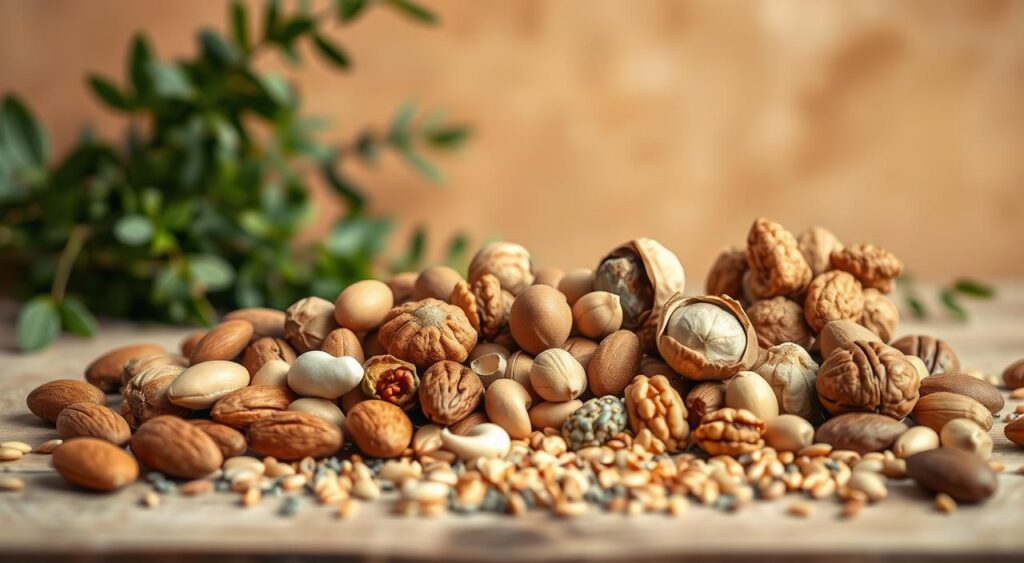
Discovering nature’s secret weapons against high cholesterol might be as simple as reaching for a handful of nuts and seeds. These tiny nutritional powerhouses pack a serious punch when it comes to supporting heart health and managing cholesterol levels.
Nuts are extraordinary cholesterol lowering foods that deliver a remarkable combination of healthy fats, protein, and essential nutrients. Walnuts stand out as champions in this category, providing unique cardiovascular benefits that can transform your diet.
- Walnuts reduce bad LDL cholesterol
- Almonds improve heart health markers
- Chia seeds provide omega-3 fatty acids
- Flaxseeds help lower cholesterol naturally
When incorporating these nutritional gems into your diet, portion control is key. While nuts are rich in healthy fats, they’re also calorie-dense. A recommended serving is typically around 1-2 ounces per day.
| Nut/Seed | Cholesterol Impact | Serving Size |
|---|---|---|
| Walnuts | Significantly reduces LDL | 1 ounce (14 halves) |
| Almonds | Lowers total cholesterol | 1 ounce (23 almonds) |
| Chia Seeds | Improves cholesterol profile | 2 tablespoons |
You can easily sprinkle these cholesterol lowering foods into your daily meals. Try adding chopped nuts to your morning oatmeal, blending seeds into smoothies, or enjoying a handful as an afternoon snack. Your heart will thank you for making these small yet powerful dietary changes.
Avocados: The Creamy Path to Better Heart Health
Learn how this creamy green fruit can help manage your cholesterol. Avocados are great for lowering LDL cholesterol. They also offer healthy fats that are good for your heart.
Avocados are full of monounsaturated fatty acids. They are a tasty way to improve your cholesterol levels. These fruits are packed with nutrients that help your heart by lowering bad cholesterol and increasing good cholesterol.
Creative Ways to Enjoy Avocados in Your Diet
- Spread mashed avocado on whole-grain toast
- Blend into smoothies for extra creaminess
- Use as a salad topping or dressing base
- Create heart-healthy guacamole
- Slice into omelets or egg dishes
Optimal Serving Sizes for Maximum Benefits
| Serving Size | Nutritional Impact | Cholesterol Benefits |
|---|---|---|
| 1/4 avocado (50g) | 160 calories | Helps reduce LDL levels |
| 1/2 avocado (100g) | 320 calories | Significant cholesterol management |
| 1 whole avocado (200g) | 640 calories | Maximum heart health support |
Nutritionists say to eat 1/2 to 1 avocado daily as part of a balanced diet. It’s important to eat them in moderation. These healthy fats are high in calories, so watch your portions. Your heart will be grateful if you make avocados a regular part of your meals.
Pro tip: Choose ripe avocados with a slight give when gently pressed, ensuring maximum flavor and nutritional benefits.
Adding avocados to your diet is more than just enjoying a tasty food. It’s a smart choice that supports your heart health.
Olive Oil: The Mediterranean Secret to Heart Health
Olive oil is a key part of the Mediterranean diet, great for your heart. It’s more than just a cooking oil; it’s a heart protector. The healthy fats in olive oil help reduce inflammation and boost heart health.
Extra virgin olive oil is the best choice for heart health. It’s full of antioxidants and healthy fats. These can lower bad cholesterol and make your heart stronger. Studies show that people who eat like the Mediterranean diet have less heart disease.
- Choose extra virgin olive oil for maximum health benefits
- Aim for 2-4 tablespoons daily
- Use as a salad dressing or cooking oil
- Replace saturated fats with olive oil
When picking olive oil, go for cold-pressed, unrefined types for the most nutrients. Dark glass bottles keep the oil fresh, giving you the best quality.
| Olive Oil Type | Heart Health Benefits | Recommended Usage |
|---|---|---|
| Extra Virgin | Highest antioxidant content | 2-4 tablespoons daily |
| Virgin | Moderate antioxidant levels | 1-2 tablespoons daily |
| Regular Olive Oil | Least nutritional impact | Limited benefits |
Adding olive oil to your meals is easy. Drizzle it on salads, use it for light cooking, or swap butter for it. Your heart will appreciate this simple change.
Essential Cholesterol Lowering Foods for Daily Meals
Creating a heart healthy diet is easy. Just plan your meals wisely. This way, you can enjoy tasty food while keeping your cholesterol in check.
To improve your diet, know which foods are good for your heart. The Mayo Clinic suggests choosing foods rich in nutrients. These foods help fight high cholesterol naturally.
Breakfast Options to Start Your Day Right
- Oatmeal with fresh berries
- Whole grain toast with avocado
- Greek yogurt with nuts
- Spinach and egg white omelet
Lunch and Dinner Choices for Heart Health
Your meals should have lean proteins, veggies, and whole grains. Here are some good choices:
| Meal Type | Recommended Foods |
|---|---|
| Lunch | Grilled salmon, quinoa salad, mixed greens |
| Dinner | Baked chicken, roasted vegetables, brown rice |
Healthy Snacks That Support Your Heart
Smart snacking keeps your energy up and supports your diet. Try these:
- Almonds (1 ounce serving)
- Apple slices with almond butter
- Carrot sticks with hummus
- Edamame
Remember, consistency is key in managing cholesterol through nutrition. Small, sustainable changes can make a big difference in your heart health.
Plant Sterols and Stanols: Natural Cholesterol Blockers
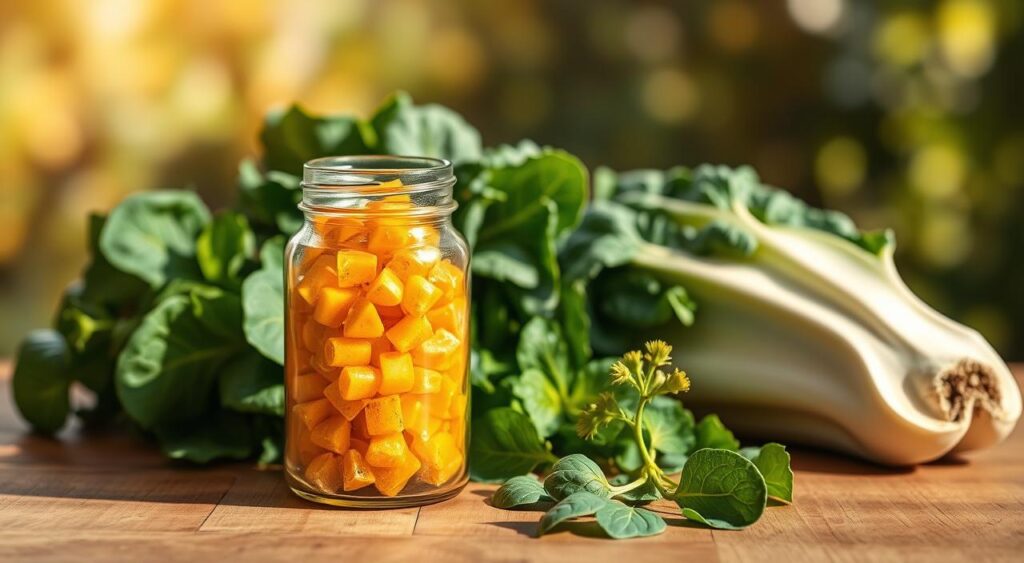
Discover the power of plant sterols, a secret weapon in natural cholesterol remedies. These remarkable compounds found in plant-based foods can help block cholesterol absorption. This offers a natural approach to heart health.
Plant sterols work by mimicking cholesterol’s molecular structure. They trick your body into reducing cholesterol absorption. When you consume foods rich in plant sterols, they compete with cholesterol molecules in your digestive system. This prevents them from entering your bloodstream.
- Natural sources of plant sterols include:
- Vegetable oils
- Nuts and seeds
- Whole grains
- Fruits and vegetables
Adding just 2 grams of plant sterols to your daily diet can potentially lower LDL (bad) cholesterol by 5% to 15%. Many food manufacturers now offer fortified products like margarine, orange juice, and yogurt enriched with these beneficial compounds.
While plant sterols are powerful, they work best as part of a heart-healthy diet. Consider consulting with a healthcare professional. They can help you determine the most effective strategy for incorporating these natural cholesterol remedies into your nutrition plan.
- Pro tips for maximizing plant sterol benefits:
- Choose fortified foods
- Maintain a balanced diet
- Combine with regular exercise
- Monitor your cholesterol levels
Your heart will thank you for embracing these natural, science-backed strategies. They support cardiovascular wellness.
Fiber-Rich Foods That Combat High Cholesterol
Protecting your heart starts with understanding the power of fiber, mainly soluble fiber. These foods can be your secret weapon for a healthy heart. Not all fiber is the same, and knowing the difference helps you make better food choices.
Soluble vs. Insoluble Fiber: What’s the Difference?
Soluble fiber works like a sponge in your stomach, helping to lower cholesterol. It’s different from insoluble fiber, which helps food move through your body. Soluble fiber grabs onto cholesterol and helps get rid of it.
- Soluble fiber reduces LDL cholesterol (bad cholesterol)
- Helps slow down sugar absorption
- Supports overall heart health
Meeting Your Daily Fiber Requirements
Experts say you should eat 25 to 30 grams of fiber every day. You can get this by eating a variety of fiber-rich foods. Whole grains, legumes, fruits, and veggies are great sources of soluble fiber.
- Oatmeal: 4 grams per cup
- Beans: 6-8 grams per half-cup
- Apples: 3-4 grams per medium fruit
By adding these foods to your meals, you can help your heart and lower cholesterol. Remember, small changes in your diet can have a big impact on your heart health.
The Role of Lean Proteins in Cholesterol Management
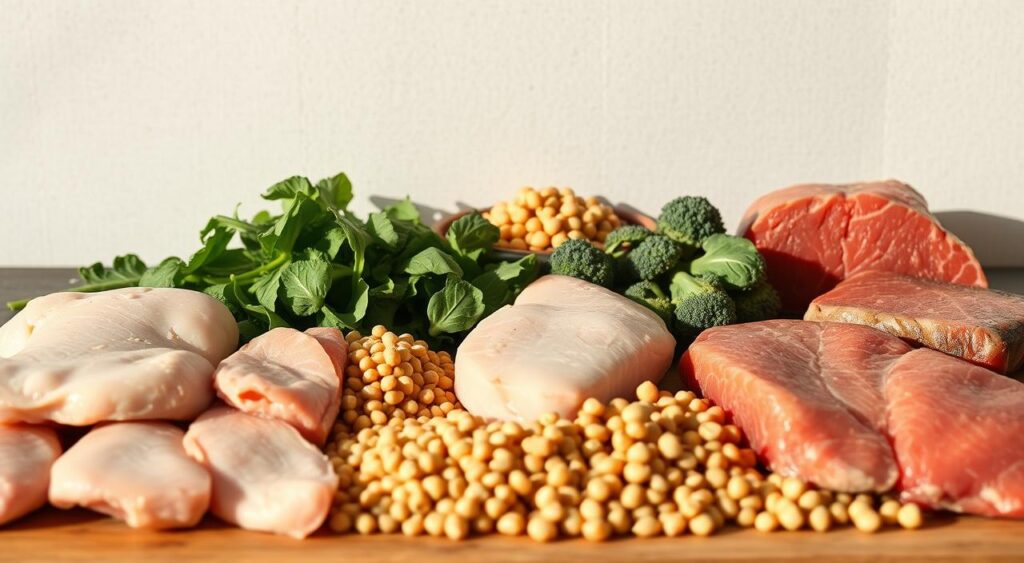
Your heart healthy diet is key to managing cholesterol. Lean proteins are a strong tool for lowering LDL cholesterol. They also help keep your heart healthy.
Choosing the right proteins is important for your cholesterol levels. Switching from red meat to lean proteins can lower bad cholesterol. This supports your heart health.
- Skinless chicken breast
- Turkey
- Fish rich in omega-3
- Plant-based protein options
- Egg whites
When picking proteins to lower LDL, choose cooking methods that keep nutrients. Grilling, baking, and steaming are good. They keep protein quality high without adding bad fats.
| Protein Source | Cholesterol Impact | Recommended Servings |
|---|---|---|
| Skinless Chicken | Low LDL Impact | 2-3 servings/week |
| Salmon | Reduces LDL | 2 servings/week |
| Tofu | Neutral/Positive | 3-4 servings/week |
“Your protein choices can be a powerful weapon in managing heart health.” – American Heart Association
Remember, variety is important in a heart healthy diet. Mix up your protein sources. This ensures you get balanced nutrition and the most cholesterol-lowering benefits.
Berries and Fruits: Sweet Solutions for Heart Health
Keeping your heart healthy doesn’t have to be boring. Nature has tasty ways to help, found in the produce section. Berries and other fruits are key for a heart-healthy diet.
Fruits are full of nutrients that help control cholesterol. They’re low in calories and high in good stuff for your heart. Adding these sweet foods to your meals can boost your heart health.
Top Fruit Choices for Cholesterol Control
- Blueberries: Full of antioxidants that fight inflammation
- Strawberries: Lower LDL cholesterol
- Apples: Have pectin, which helps bind cholesterol
- Pomegranates: Improve blood flow and reduce plaque
Optimal Serving Sizes
For the best heart health, eat 2-3 fruit servings a day. A serving is one medium fruit, half a cup of fresh, or a quarter cup of dried. Whole fruits are better than juices because they have more fiber and less sugar.
Pro tip: Mix different berries into your morning oatmeal or yogurt for a delicious cholesterol-fighting breakfast!
Beans and Legumes: Protein-Packed Cholesterol Fighters
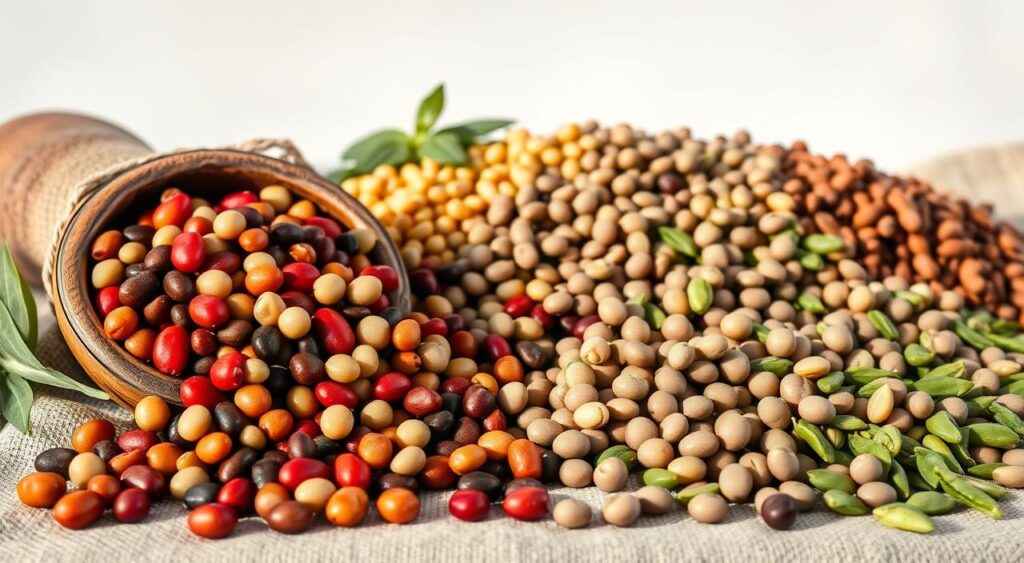
Adding beans and legumes to your diet can greatly improve your heart health. These foods are full of soluble fiber and plant-based protein. They are great for managing cholesterol levels.
Each type of bean has its own benefits for your heart. Kidney beans, black beans, and chickpeas are top choices. They are high in soluble fiber, which helps keep cholesterol from being absorbed into your blood.
- Kidney beans: Reduce LDL cholesterol by up to 19%
- Black beans: Rich in antioxidants that support heart health
- Chickpeas: Provide essential nutrients while lowering cholesterol
Pro tip: Aim to incorporate at least 1/2 cup of beans into your daily meals for maximum cholesterol-fighting benefits.
“Beans are not just a side dish, they’re a heart-protective superfood” – American Heart Association
Here are some tips for cooking beans to get the most nutritional value:
- Soak dried beans overnight to reduce cooking time
- Use low-sodium broth for added flavor
- Rinse canned beans to reduce sodium content
Adding beans and legumes to your diet is a smart choice. They are easy to include in salads, soups, and main dishes. This makes heart-healthy eating both tasty and easy.
Smart Food Swaps for Lower Cholesterol
Changing your diet for heart health doesn’t mean giving up taste. Small changes can make a big difference in your cholesterol and heart health. By swapping foods, you can cut down on bad fats and enjoy tasty meals.
Smart food swaps are a smart way to manage cholesterol. These easy swaps help you cut down on bad fats and add healthier foods to your diet.
Dairy Alternatives
Switch to healthier dairy options:
- Replace whole milk with unsweetened almond or oat milk
- Choose low-fat Greek yogurt instead of full-fat versions
- Use plant-based cheese made from nuts for healthy fats
Meat Substitutes
Find leaner protein sources:
- Select lean chicken or turkey over red meat
- Incorporate plant-based proteins like tofu and tempeh
- Try fish rich in omega-3 fatty acids
Healthy Oil Options
Choose better oils for cooking:
- Replace butter with olive oil
- Use avocado oil for high-heat cooking
- Choose cold-pressed coconut oil in moderation
By making these smart food swaps, you’re on your way to a healthier heart. Remember, small steps can lead to big changes in your health.
Building a Heart-Healthy Meal Plan
Making a heart-healthy diet is easy. The Mediterranean diet is a great guide for keeping your heart safe and enjoying tasty meals. Your aim is to eat well-balanced meals that help manage cholesterol and boost overall health.
Begin by choosing whole foods that are full of nutrients. A good meal plan should include:
- Lean proteins like fish and legumes
- Whole grains such as quinoa and brown rice
- Plenty of fruits and vegetables
- Healthy fats from olive oil and nuts
Learning the basics of a heart-healthy diet makes meal prep simpler. Here’s a simple daily meal plan:
| Meal | Recommended Options |
|---|---|
| Breakfast | Oatmeal with berries, chia seeds |
| Lunch | Grilled salmon, mixed green salad |
| Dinner | Chicken breast, roasted vegetables |
| Snacks | Nuts, fresh fruit, Greek yogurt |
Your Mediterranean diet should focus on variety, portion control, and nutrient-rich foods. Consistency is key to keeping your heart healthy through what you eat.
Foods to Avoid for Better Cholesterol Levels
Your diet is key to managing cholesterol. Some foods can harm your efforts to keep LDL cholesterol low. Knowing which foods to limit is important for heart health.
Some foods can greatly increase bad cholesterol. This can hurt your health goals. Here are foods to cut down or avoid:
- Processed meats high in saturated fats
- Fried foods loaded with trans fats
- Sugary beverages and desserts
- Refined carbohydrates
- Full-fat dairy products
Trans fats are very bad for cholesterol. They can raise LDL cholesterol and lower HDL. Fast food, snacks, and some baked goods often have hidden trans fats.
Sugary foods also pose a problem. Too much sugar can cause inflammation and harm cholesterol levels. Choose whole, unprocessed foods that help manage cholesterol naturally.
“Your food choices are powerful weapons in managing cholesterol naturally.” – Heart Health Experts
To lower LDL, eat whole grains, lean proteins, and plants. Swap unhealthy foods for nutrient-rich ones that help your heart.
Conclusion
Changing your diet with foods that lower cholesterol is a great way to keep your heart healthy. You’ve found many tasty options to help control your cholesterol naturally. From fish to nuts and whole grains, you now know how to make a heart healthy diet.
Even small changes can have a big effect. Start adding these healthy foods to your meals slowly. Your body will be grateful for choosing foods that help balance cholesterol and lower heart risks. Remember, being consistent is important for long-term heart health.
Your journey to better cholesterol management doesn’t have to be hard or boring. By choosing these foods, you’re taking steps to protect your heart. Think of this guide as your plan for making tasty, nutritious meals that are good for your heart.
With the right knowledge and food choices, you can greatly improve your heart health. Listen to your body, stay informed, and enjoy the tasty journey to a stronger, healthier heart.

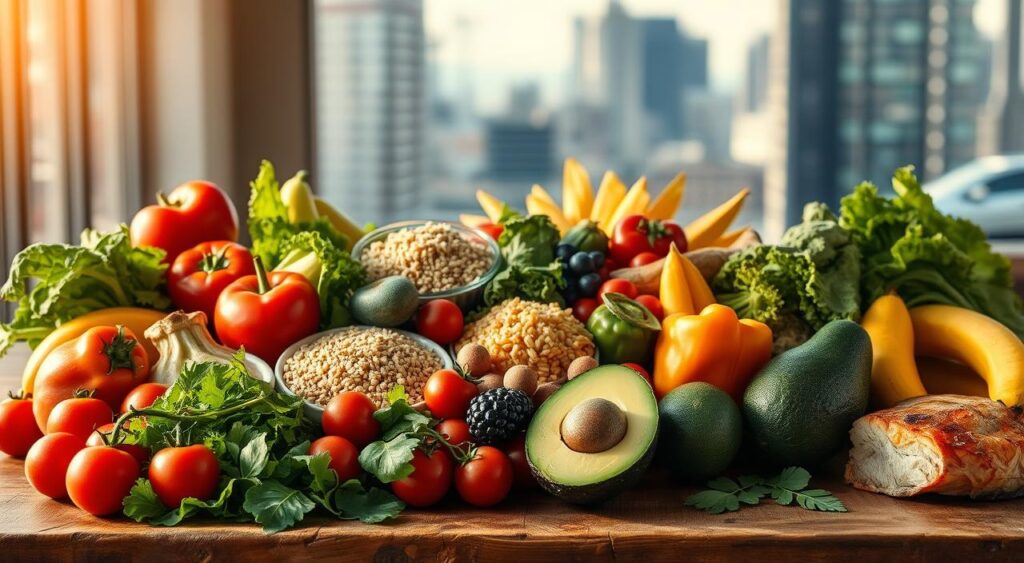


Pingback: How to Lower Triglycerides With Food in 30 Days
Pingback: 15 Foods That Lower Cholesterol (LDL) Naturally
Pingback: Thyroid Diet: Nutrients, Meal Ideas, and Red Flags
Pingback: Top 20 Gut-Healthy Foods (and How to Use Them Daily)
Pingback: LDL vs HDL: What Your Ratios Should Look Like in 2025